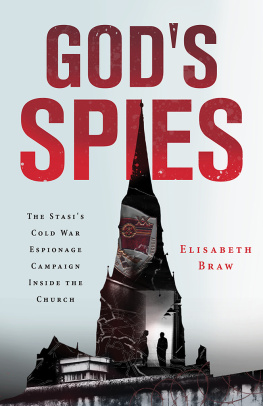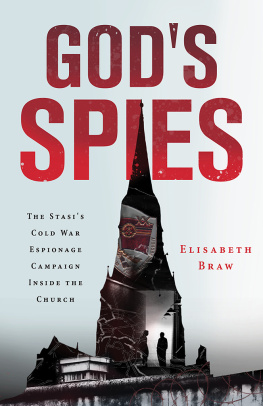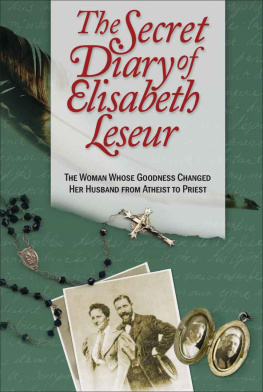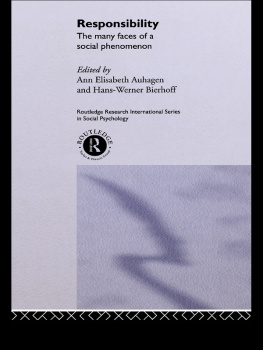Elisabeth Braw - Gods Spies
Here you can read online Elisabeth Braw - Gods Spies full text of the book (entire story) in english for free. Download pdf and epub, get meaning, cover and reviews about this ebook. year: 2021, publisher: Wm. B. Eerdmans Publishing, Co., genre: Detective and thriller. Description of the work, (preface) as well as reviews are available. Best literature library LitArk.com created for fans of good reading and offers a wide selection of genres:
Romance novel
Science fiction
Adventure
Detective
Science
History
Home and family
Prose
Art
Politics
Computer
Non-fiction
Religion
Business
Children
Humor
Choose a favorite category and find really read worthwhile books. Enjoy immersion in the world of imagination, feel the emotions of the characters or learn something new for yourself, make an fascinating discovery.
- Book:Gods Spies
- Author:
- Publisher:Wm. B. Eerdmans Publishing, Co.
- Genre:
- Year:2021
- Rating:4 / 5
- Favourites:Add to favourites
- Your mark:
- 80
- 1
- 2
- 3
- 4
- 5
Gods Spies: summary, description and annotation
We offer to read an annotation, description, summary or preface (depends on what the author of the book "Gods Spies" wrote himself). If you haven't found the necessary information about the book — write in the comments, we will try to find it.
Gods Spies — read online for free the complete book (whole text) full work
Below is the text of the book, divided by pages. System saving the place of the last page read, allows you to conveniently read the book "Gods Spies" online for free, without having to search again every time where you left off. Put a bookmark, and you can go to the page where you finished reading at any time.
Font size:
Interval:
Bookmark:
GENERAL
| AfD | Alternative fr Deutschland |
| AfNS | Agency for National Security |
| BND | Bundesnachrichtendienst |
| BStU | Der Bundesbeauftragte fr die Unterlagen des Staatssicherheitsdienstes der ehemaligen Deutschen Demokratischen Republik (Federal Commissioner for the Records of the State Security Service of the former German Democratic Republic) |
| CIA | Central Intelligence Agency |
| CSCE | Conference for Security and Cooperation in Europe |
| CSSR | Czechoslovak Socialist Republic |
| DM | Deutsche mark or deutschmark |
| FDJ | Freie Deutsche Jugend |
| FRG | Federal Republic of Germany |
| GDR | German Democratic Republic |
| HVA | Hauptverwaltung A |
| IAEA | International Atomic Energy Agency |
| IM | Inoffizieller Mitarbeiter |
| KGB | Soviet State Security Committee |
| LWF | Lutheran World Federation |
| MfS | Ministry for State Security (Stasi) |
| OibE | Offizier im besonderen Einsatz |
| OPEC | Organization of Petroleum Exporting Countries |
| OSCE | Organization for Security and Cooperation in Europe |
| PDS | Partei des Demokratischen Sozialismus |
| RSHA | Reichssicherheitshauptamt |
| SED | Sozialistische Einheitspartei Deutschlands (Socialist Unity Party of Germany; East Germanys ruling party) |
| WCC | World Council of Churches |
| WKW | Wer kennt wen (who knows whom) |
| YMCA | Young Mens Christian Association |
AGENTS AND THEIR CODE NAMES
(names in bold are principal players in the story)
| Bambowsky, Gerd | IM Gerd |
| Fritzsche, Hans-Georg | IM Fritz |
| Hammer, Detlef | IM Detlef, also IM Gnther |
| Hansen, Knuth | IM Paul |
| Holtz, Traugott | IM Prof. Baum |
| Kapiske, Jrgen | IM Walter |
| Krgel, Siegfried | IM Lorac |
| Mller, Hanfried | IM Hans Meier |
| Plath, Siegfried | IM Hiller |
| Radler, Aleksander | IM Thomas |
| Stolpe, Manfred | IM Sekretr |
| Stolt, Frank | IM Hermann Schneider |
ESTABLISHING A
SECRET POLICE FORCE
April 1952. The German Democratic RepublicEast Germanywas not even three years old. A strapping young man took the train to East Berlin from his hometown of Oschatz near his countrys border with Czechoslovakia. In East Berlin, he changed to a local train that took him to nearby Potsdam, a city famous for its Versailles-inspired Sanssouci palacean enduring legacy of the eighteenth-century king Frederick the Great. Sanssouci still resembled Versailles, what with its cheery rococo buildings and stunning terraced gardens. But arriving in Potsdam, the young man didnt head toward the Sanssouci or any of the citys nineteen other palaces.
The young mans name was Joachim Wiegand. Even though this was his first visit to the city of Frederick the Great, he most certainly didnt have relaxation in mind. Instead he steered his steps toward the Eiche-Golm neighborhood.
He walked past several military-like installations guarded by young men like him. With East Germany still lacking armed forces, the paramilitary Barracked Peoples PoliceArmys Thirty-Fourth Artillery Division for a chat with his contemporaries, he would have been asked to leave, or worse.
More nefarious Soviet activities were also taking place in Potsdam. In Leistikow-Strasse (Leistikow Street), a half-hour walk from the Sanssouci, Soviet military counterintelligence had appropriated a vicarage and turned it into a large jail where it held suspected spies. The vicarages windows and doors had been sealed by bricks, with only tiny openings for the inmates to see the daylight. Though passersby such as Wiegand couldnt see them, around three dozen Germans and Russians were being held in the vicarage, which now housed thirty-six cells. They were often beaten too. Until the midfifties, between nine hundred and twelve hundred mostly innocent people would be imprisoned here.
Soon Wiegand arrived at 28 Karl-Liebknecht-Strasse, another former Wehrmacht site. The lanky twenty-year-old with the thick dark hair and winning smile presented himself to a uniformed official. Raised by a single mother, Wiegand had been forced to start working at a young age, assisting at a farm near his hometown. The idea of further education had never entered his mind. But in Potsdam, Wiegand soon found himself in a classroom with other young men. Like Wiegand, the others came from working-class backgrounds; most of them had been working as farmhands, bricklayers, or welders.
They were to play an incalculable role in the future of their country. Wiegands new school was the Schule des Ministeriums fr Staatssicherheit (the School of the Ministry for State Security). The students and instructors already called it the MfS School, using the Ministry for State Securitys acronym. Wiegand had dedicated his life to the MfSor the Stasi, as most people call it.
The MfS School was the Stasis new cadre factory. Founded in 1951, its task was to give cadres political knowledge and convey to them the teachings of Marx, Engels, Lenin and Stalin as instructions for action, Wilhelm Zaisser, East Germanys first minister of state security, had declared upon opening the school, adding that it would also teach the students operative work. Like their Communist comrades around the world, the GDRs Communists loved the word cadre, originally a Latin word that Western dictionaries define as a small group of people specially trained for a particular purpose or profession; it can also mean a member of such a group. If you were deemed to be a promising Communist, you were selected as a cadre.
Zaisser was himself a veteran Communist warrior. Born in 1893, he had initially worked as a teacher in Germany before becoming a Communist official, serving the Communist Party in China, Czechoslovakia, and the Soviet Union. The Moscow Communists had then dispatched him to the Spanish Civil War, where right-wing Nationalists were fighting left-wing Republicans. Despite his lack of previous combat experience, Zaisser excelled at the task and rose to lead the Republicans international brigades. His nom de plume: General Gomez.
Now Zaisser had returned to Germany, or rather, he had returned to the part of the country that had become East Germany. Under his direction, the MfS had devised a curriculum that mixed intelligence classes, weapons training, and sports with Polit-Unterricht, a course in Communist ideology. After each thought of Lenin that we discuss, the teacher asks us: What did Stalin say about it? We quickly react and soon add Stalins opinion without being prompted, one student said, describing such lessons. The students were also taught about the operations of Western intelligence agencies.
When returning home during school breaks, Wiegand told his friends in Oschatz and Meissen, a larger town nearby, nothing of the education he was receiving. Doing so would have been a terrible idea. Officially the MfS School didnt exist, and even MfS officials habitually referred to it as the Eiche School. Even at this early stage, the school had the logistics in place: there was an auditorium and seminar rooms, and barracks where the students slept. Students were assigned to guard duty on a rotating schedule. To maintain secrecy, the school didnt let its students leave the compound during the school week. Every now and then, they played soccer together, and occasionally there was a theater visit. An occasional collective excursion to the cinema was an eagerly awaited luxury. But as a rule, the students were supposed to be in their barracks. Not a subtle agency, the Stasi had also erected a makeshift jail on the school grounds for misbehaving students.
Next pageFont size:
Interval:
Bookmark:
Similar books «Gods Spies»
Look at similar books to Gods Spies. We have selected literature similar in name and meaning in the hope of providing readers with more options to find new, interesting, not yet read works.
Discussion, reviews of the book Gods Spies and just readers' own opinions. Leave your comments, write what you think about the work, its meaning or the main characters. Specify what exactly you liked and what you didn't like, and why you think so.













